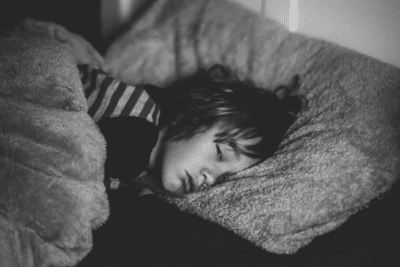When Should I Stop Scheduling Nap Time for my Kids?
When should you stop scheduling nap time?
I got this question the other day and found it very interesting.
If you’re a parent, you probably already know that there’s no one-size-fits-all formula for taking care of a kid perfectly.
Each child is just too different to write up something like that.
In my own family, my three kids were all completely different to take care of as kids.
The first two boys are the best example: the first child made my wife and I ask, “what’s all this fuss about no sleep with kids?” because that baby slept well and very often.
The second baby, however…he was a different story altogether.
The only reason I even mention any of this is to remind you that all kids are different.
As much as anyone may try to say, “by age 2, they should be sleeping X amount and know Y many words,” we really still have no idea.
There are so many things that are both environmental and genetic at play, and the human brain is incredibly complex.
All that being said, let’s discuss nap times and why they’re important…as well as when (and if) it’s a good idea to stop scheduling nap time as a “required” piece of a daily routine.
Sleep is where your kid’s growth happens.
Sleep is the most anabolic time in anyone’s lives.
In my blog about puberty & sleep, I discussed this a little more in detail – but basically, anything “anabolic” means that it’s working on building or expanding.
So, in the case of the body, sleep is basically the only time that the body is able to really be anabolic.
95-99% of all anabolic activities occur while we’re asleep.
For kids, sleep is even more important than it is for adults. Kids are literally still building themselves and lack of sleep will cause serious problems later in life.
In childhood, the brain is only concerned with learning how the world works.
It’s looking for immediate-results responses from everything and cannot process cause and effect beyond “if I drop this, it falls every time.”
As a child gets older, the prefrontal cortex is still forming. That’s the part of the brain that allows for understanding of a long-term future and planning things out.
This growth occurs until as late as age 25 in some men. For women, their prefrontal cortex is typically done anywhere from 18-22, but theirs could continue forming until 25 as well.
Sleeping enough is a crucial piece of making sure that part of the brain forms correctly.
And beyond brain development, the body is also growing at a rapid rate until the person reaches the end of puberty – whenever that is for them.
To say sleep is a necessary part of health, especially for kids, is an understatement.
How much sleep do kids need?
Long story short: we don’t know.
Going back to my personal experience with kids, it wasn’t uncommon for that first son to sleep 21 hours per day.
This goes back to the difficulty in defining any metrics of “normalcy” in the development of kids.
Sure, we can average out how tall a kid typically is at a certain age, but that would just be averaging. That’s not the same thing as “normal” or healthy.
So, when it comes to how much sleep your kid needs, I always say: give them as much as they want.
If they’re being finicky about sleep, give them as much as they’ll take.
They might fight you on it a bit at first when you try to get them to rest when they don’t want to, but they’ll settle soon enough and you can rest assured that you’re doing something for your child that their body desperately needs for proper growth.
More sleep encourages more growth – physical and mental.
While more sleep does encourage more growth, sometimes that’s not as easy to see.
So, another key thing to pay attention to when it comes to your kid’s sleep needs is how they’re behaving.
If we think of children as learning machines (which they are), this makes a little more sense.
I once had a Spanish teacher tell me that we hear 2,000 hours of English spoken around and to us before we ever try saying our first word ourselves.
That means, for 2,000 hours, each kid is listening intently and using all of their brain power to try and understand what speaking even is, and what any of it might mean.
And kids are doing this with everything around them.
All day, every day, a kid’s job is basically to just understand how physics and language and all of the basic mechanics of the world work.
We don’t remember this because those memories don’t tend to stick, but it’s an extremely active time for small humans.
That being said, one of the best ways to note if your child is in need of more sleep is to take note of any time you see a drop-off in learning or prefrontal cortex activity.
For the learning piece of that, it could be something as simple as seeing them lose interest in their toy or
And when it comes to monitoring prefrontal cortex activity, this has to do with attention in small children.
So, if you say their name and they typically know that means to look at you and they do look at you when you say it, they’re probably fine.
But if they begin ignoring you or other subtle cues that they typically know how to respond to, that means their brain needs recover time…AKA sleep.
You know how your child typically behaves and if any sort of attention decrease happens, that’s your hint as a parent to put them in a restful environment ASAP to help their brain and body recover.
This allows them to store the new information from the day more effectively, helping them learn faster.
Even if you put your kid in their crib or bassinet and they just sit there for a little bit, you’re still setting them in a new place that encourages rest.
This might be all they need at the time, but you’ll probably be surprised at how many times you go back to check on them and find them sleeping after all.
So…when should you stop scheduling nap time for your kids?
Okay, I know I addressed a lot of other things before getting to the main topic on this blog.
But that’s because there are a lot of considerations to remember here and the truth is, the answer to the following is short:
When should naps be removed from a daily routine for kids?
Never.
There’s no point in your life – even into adulthood and old age – when more sleep will not benefit you.
Sure, we can get into logistics on the types of naps that help with different goals, but the truth is if you’re tired, you should allow yourself to sleep.
Denying yourself or anyone else sleep is like denying nourishment or education.
It would be neglectful, and we sorely need to change the general perception on “less sleep for more work is productive!”
In my opinion, that couldn’t be further from the truth.
So, if your kid is like my second son and could use some encouragement in getting that necessary shuteye…check out my new Sleep Remedy Kids supplement.
It’s non-addictive, effective, and delicious.
You can learn more about it here:




